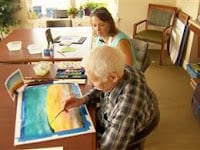
Advertise with Alzheimer’s Weekly
Deliver your message to a highly-targeted audience on alzheimersweekly.com and in the Alzheimer’s & Dementia Weekly Newsletter.

Deliver your message to a highly-targeted audience on alzheimersweekly.com and in the Alzheimer’s & Dementia Weekly Newsletter.

Vascular dementia is a common dementia, often brought on by stroke. Check out strategies to prevent stroke in women.

172 participants showed a personalized health and lifestyle coach can delay or even prevent memory loss.

VIDEO + TRANSCRIPT: See what a 99-year-old Florida man, jumping from a plane, has to say about Alzheimer’s research.

Scott Russell is living well with his Alzheimer’s. See how he has stayed active in his community, even starting a manageable home business.

Healthy living lowers Alzheimer’s risk. Today’s healthier lifestyles have witnessed a drop in the rate of Alzheimer’s. Watch The Wall Street Journal interview a new wave of adults changing lifestyles to keep Alzheimer’s away.

Do conscientiousness, extraversion and positive affect make your brain dementia-resistant?

PseudoBulbar Affect (PBA) in dementia is characterized by sudden, uncontrolled outbursts of laughing and/or crying. Learn how Nuedexta helps people with Alzheimer’s and dementia affected by PBA.

Delaying retirement can delay dementia in a big way. Learn why.

MEDICATION VIDEO: Aricept® (generic DONEPEZIL) is the world’s most popular drug for Early-stage Alzheimer’s. Does it help in Advanced-stage Alzheimer’s?

All a caregiver for Lewy Body Dementia needs to know, from symptoms to diagnosis to care for their loved one and themselves, for the entire caregiving journey. Part memoir and part help book.

Does pain relief risk cognitive cost? A major new study of almost 200,000 people says yes—and the price may be higher than we thought.

SHORT-TERM MEMORY lapses are obvious signs of Alzheimer’s, but other tell-tale signals begin to show much earlier. Learn how to look for semantic impairments, such as simple questions about size.

Learn about ‘personalized music for dementia’ and its powerful effect on Alzheimer’s. See the Director of the hit film, ‘Alive Inside’, on the dementia-impact of music.

The brush strokes are precise, the colors vibrant. See a Colorado art program help patients rise above dementia, while the paintings raise money for The Alzheimer’s Association.

The protein BDNF builds synapses in the human brain, nurturing brain cells and fighting off dementia. While there is no artificial way of boosting it, social and cognitive activity can.

People may not have easy access to sophisticated, expensive dementia tests. A simple test from Einstein Medicine uses a stopwatch and a few questions to determine one’s risk of dementia. The potential payoff could be tremendous for individuals, their families and society.
No spam, only news and updates.


